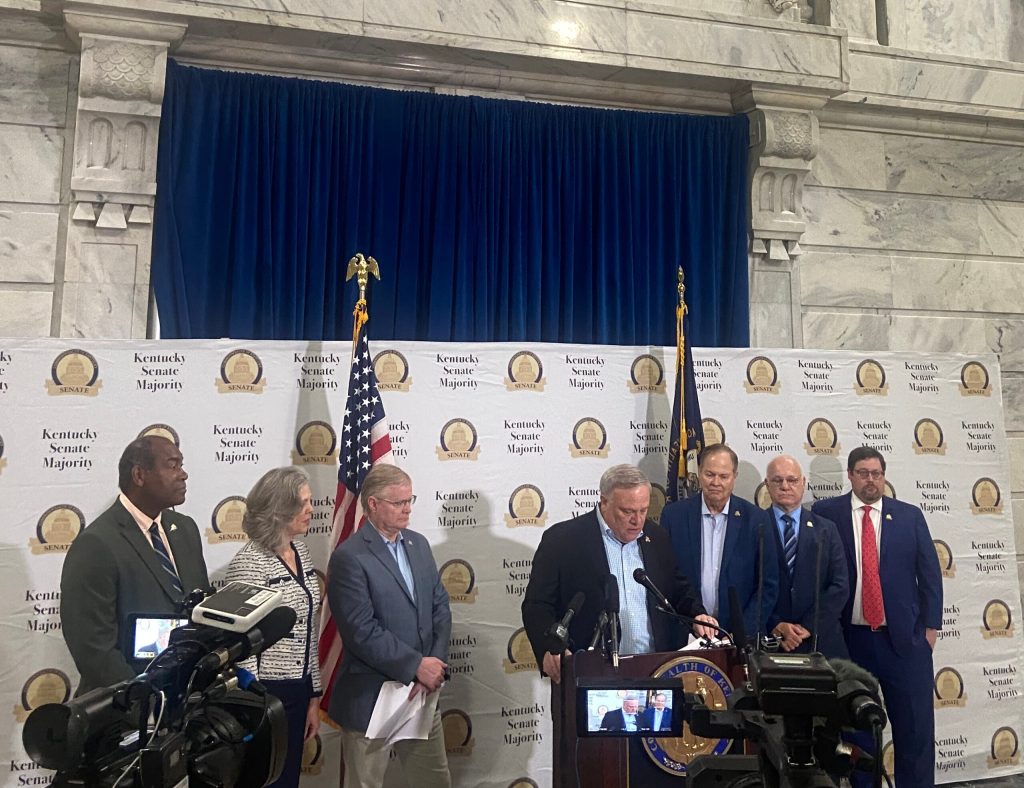What to take away from the 2024 legislative session
Published 2:49 pm Thursday, April 18, 2024

- A group of Senate Majority Republicans talk to the press about the 2024 legislative session in the Capitol rotunda in Frankfort on Wednesday, April 17.
FRANKFORT — The longest “long” legislative session in many years wrapped up on April 15.
So far, Gov. Andy Beshear has signed 169 bills into law. Nearly four dozen more have either been enacted over Beshear’s veto or allowed to become law without his signature.
The budget
During long sessions, the legislature passes a two-year budget that sets spending for the upcoming biennium.
A group of Senate Republican leaders shared their budget wins Wednesday. Outgoing Senate Floor Leader Damon Thayer, R-Georgetown, said the budget sets the stage for more income tax cuts.
For the past few years, the legislature has incrementally cut Kentucky’s income tax, with the goal of eventually eliminating it. However, the state needs to meet certain spending thresholds to move forward, and it failed to do so in 2023.
Meeting the threshold was a top priority throughout budget talks.
“Because of the conservative management and fiscal discipline we showed during the budget process, Kentuckians by this time in 2026 will have their taxes cut yet again a fourth time down to 3.5%,” Thayer said.
The budget increased the SEEK formula, the state’s core education funding mechanism, by 9% across the biennium.
Sen. Mike Wilson, R-Bowling Green, said superintendents have told him that would allow for “significant raises to our teachers.”
The increase would not come close to Gov. Andy Beshear’s proposed 11% across the board raise for teachers and classified staff; it might amount to half that amount for some districts.
Wilson also mentioned the budget’s increase to student transportation funding, a portion of the SEEK formula allowing state matches on local contributions and $80 million to fund the teachers’ pensions on top of the statutorily required amount.
Both Republicans and Democrats agree the budget delivered for Louisville. It included $100 million to Louisville Metro Government for various projects, including some downtown improvements.
However, Louisville Democratic Sen. Gerald Neal said there also was “an onslaught of bills that disproportionately targeted Louisville and are calculated to limit our autonomy.”
These include a bill making Louisville mayoral and Metro Council races nonpartisan, a task force looking into potential restructuring of Jefferson County Public Schools and a bill limiting the power of a Louisville air pollution control authority.
In response to Democrat complaints about local control and the JCPS task force, Thayer said that’s “not how it works.”
“You don’t get to get all the money that gets sent to you from the General Assembly without input on your policies from the General Assembly,” he said.
School choice amendment
This November, Kentuckians will decide whether they want to allow state education dollars to enter non-public schools.
Both Thayer and Senate President Robert Stivers, R-Manchester, said the voters’ decision would “settle this question once and for all.”
Thayer said polling makes him think Kentuckians will support the proposed constitutional amendment, but he isn’t “naive.”
“We think that there are going to be groups coming into Kentucky and groups from Kentucky that are going to be investing heavily in media and grassroots to pass the amendment.”
Lexington Democratic Representative Cherlynn Stevenson is just as convinced the school choice amendment will fail. She said it’s “nothing but a handout to the wealthiest Kentuckians who can already afford private school tuition.”
“I think that Kentuckians are smart enough to see through that effort,” Stevenson said. “It’s absolutely an effort to destroy our public schools, and we are going to win.”
A ‘chaos and cruelty agenda’
Kentucky Democratic Party Chairman Coleman Elridge said he hoped after Beshear’s reelection, the majority Republican legislature would work with him on the “issues that matter most to the people of Kentucky.’
He was disappointed by the Republicans’ “chaos and cruelty agenda,” he said.
This agenda, Elridge said, included:
- enacting a tax cut on the sale of gold, but not diapers;
- not assigning the session’s abortion exceptions bill a committee or allowing any discussion;
- “criminalizing poverty,” through the Safer Kentucky Act’s street camping provision;
- trying (but failing) to “dismantle worker protections” through bills lowering child labor standards and removing lunch breaks.
Some of the more controversial bills did not pass, including Senate Bill 6, an-anti DEI bill that would have effectively removed all diversity, equity and inclusion initiatives at Kentucky public colleges and universities.
Neal and Stevenson took partial credit for these failures.
“Because we used our voice, some of the most heinous bills will not prevail,” Neal said.
Stevenson added that keeping certain good things in the budget is a point for the Democrats in upcoming elections.
“I think the fact that we stand up and fight and the things that we are able to stop are just as important as the things that we are able to bring home,” she said.
Thayer said the Democrats don’t deserve credit for stopping anything.
Beshear’s wins
While Beshear fell short on two of his biggest priorities—11% raises for school employees and universal pre-K—a last-minute cleanup bill gave him a few wins.
Senate Bill 91 flipped caps on emergency disaster aid, allowing a higher limit for immediate emergency responses like Beshear wanted.
He also got a $300 million pool to complete I-69 and Mountain Parkway projects, conditional on securing federal matching grants, $70 million for a site development program and additional funds for a closing fund for mega economic development projects.
There were also hundreds of millions of dollars set aside for water and wastewater improvements.
While the session felt “toxic,” Beshear said that “there were some really nasty bills that thankfully failed.”

